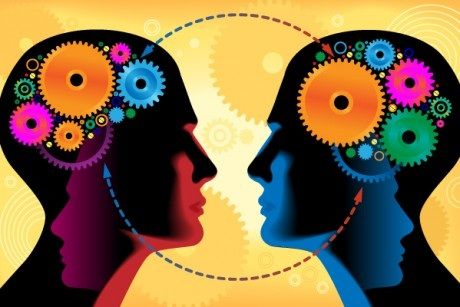Our Brain on the Maintenance of Eye Contact

Look at me while you’re talking!
If you’re anything like me, you probably have a hard time managing your eyes during conversations. Although eye contact is encouraged to maintain engagement with the other person, awkwardness could lead some to avert their gaze.
Turns out, according to Kajimura and Nomura (2016), our attempts to maintain eye contact and to rummage for the proper words are in competition for a domain general cognitive resource. To be more specific, when one tries to maintain eye contact, the default mode network is activated, which allows for self-consciousness and perception of others’ mindsets. On the other hand, verbal processing deactivates the default mode network and activates language networks. As a result, this competition between the two processes to either activate or deactivate the default mode network explains why eye contact hinders conversation. This ultimately generates an urge to break eye contact in order to facilitate verbal processing. Kajimura and Nomura’s conclusions came about from a word association game. When given a noun, the participants were asked to immediately respond with a verb that relates to the noun mentioned. For example, if the word “pie” was given, the participants would then respond with verbs such as, “eat”, “bake”, and so on. Moreover, this game was done while the participants stared at a face on a computer screen that would maintain eye contact and sometimes look away. The results showed that when faced with a challenging word, participants took longer to respond with a verb, but the response time was shorter if the participants broke eye contact.
Likewise, according to Glenberg et al. (1998), people might also avert their gaze if a question or topic being discussed has a high level of complexity or difficulty, and by averting their gaze, responses became more accurate. This study was done through a series of experiments. One of the experiments observed participants’ eye movements while they answered questions with varying levels of difficulty. In another experiment, participants were asked to answer general knowledge and mathematical questions while either closing their eyes or looking at the experimenter. The first experiment showed that participants showed a tendency to avert their gaze more as the difficulty of the questions increased. In the latter experiment, the participants scored more accurately when they had their eyes closed.
So if you ever notice someone breaking eye contact frequently, don’t take it too personally; they’re probably just trying to think. After all, what really matters in a conversation are the words being spoken and the thoughts behind them.
Author: Audrey Kim
Editor: Albert Wang
Sources:
A possible explanation for why people find it hard to maintain eye contact when talking
Averting the gaze disengages the environment and facilitates remembering